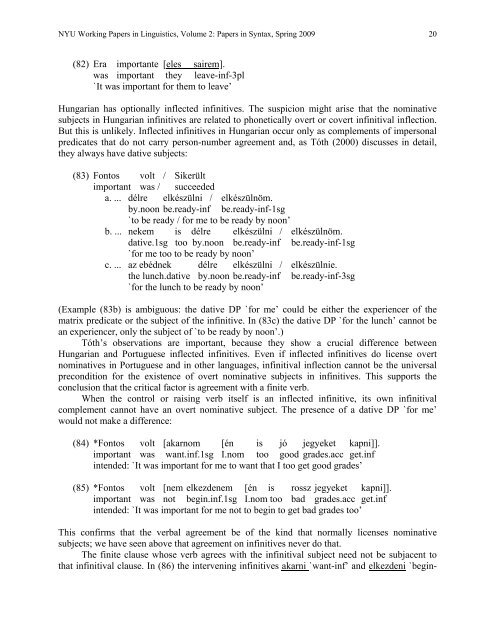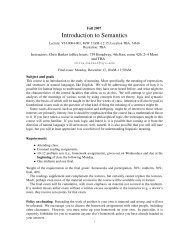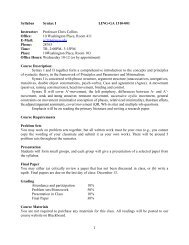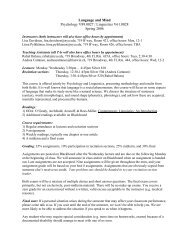Overt Nominative Subjects in Infinitival Complements Cross - NYU ...
Overt Nominative Subjects in Infinitival Complements Cross - NYU ...
Overt Nominative Subjects in Infinitival Complements Cross - NYU ...
You also want an ePaper? Increase the reach of your titles
YUMPU automatically turns print PDFs into web optimized ePapers that Google loves.
<strong>NYU</strong> Work<strong>in</strong>g Papers <strong>in</strong> L<strong>in</strong>guistics, Volume 2: Papers <strong>in</strong> Syntax, Spr<strong>in</strong>g 2009 20(82) Era importante [eles sairem].was important they leave-<strong>in</strong>f-3pl`It was important for them to leave’Hungarian has optionally <strong>in</strong>flected <strong>in</strong>f<strong>in</strong>itives. The suspicion might arise that the nom<strong>in</strong>ativesubjects <strong>in</strong> Hungarian <strong>in</strong>f<strong>in</strong>itives are related to phonetically overt or covert <strong>in</strong>f<strong>in</strong>itival <strong>in</strong>flection.But this is unlikely. Inflected <strong>in</strong>f<strong>in</strong>itives <strong>in</strong> Hungarian occur only as complements of impersonalpredicates that do not carry person-number agreement and, as Tóth (2000) discusses <strong>in</strong> detail,they always have dative subjects:(83) Fontos volt / Sikerültimportant was / succeededa. ... délre elkészülni / elkészülnöm.by.noon be.ready-<strong>in</strong>f be.ready-<strong>in</strong>f-1sg`to be ready / for me to be ready by noon’b. ... nekem is délre elkészülni / elkészülnöm.dative.1sg too by.noon be.ready-<strong>in</strong>f be.ready-<strong>in</strong>f-1sg`for me too to be ready by noon’c. ... az ebédnek délre elkészülni / elkészülnie.the lunch.dative by.noon be.ready-<strong>in</strong>f be.ready-<strong>in</strong>f-3sg`for the lunch to be ready by noon’(Example (83b) is ambiguous: the dative DP `for me’ could be either the experiencer of thematrix predicate or the subject of the <strong>in</strong>f<strong>in</strong>itive. In (83c) the dative DP `for the lunch’ cannot bean experiencer, only the subject of `to be ready by noon’.)Tóth’s observations are important, because they show a crucial difference betweenHungarian and Portuguese <strong>in</strong>flected <strong>in</strong>f<strong>in</strong>itives. Even if <strong>in</strong>flected <strong>in</strong>f<strong>in</strong>itives do license overtnom<strong>in</strong>atives <strong>in</strong> Portuguese and <strong>in</strong> other languages, <strong>in</strong>f<strong>in</strong>itival <strong>in</strong>flection cannot be the universalprecondition for the existence of overt nom<strong>in</strong>ative subjects <strong>in</strong> <strong>in</strong>f<strong>in</strong>itives. This supports theconclusion that the critical factor is agreement with a f<strong>in</strong>ite verb.When the control or rais<strong>in</strong>g verb itself is an <strong>in</strong>flected <strong>in</strong>f<strong>in</strong>itive, its own <strong>in</strong>f<strong>in</strong>itivalcomplement cannot have an overt nom<strong>in</strong>ative subject. The presence of a dative DP `for me’would not make a difference:(84) *Fontos volt [akarnom [én is jó jegyeket kapni]].important was want.<strong>in</strong>f.1sg I.nom too good grades.acc get.<strong>in</strong>f<strong>in</strong>tended: `It was important for me to want that I too get good grades’(85) *Fontos volt [nem elkezdenem [én is rossz jegyeket kapni]].important was not beg<strong>in</strong>.<strong>in</strong>f.1sg I.nom too bad grades.acc get.<strong>in</strong>f<strong>in</strong>tended: `It was important for me not to beg<strong>in</strong> to get bad grades too’This confirms that the verbal agreement be of the k<strong>in</strong>d that normally licenses nom<strong>in</strong>ativesubjects; we have seen above that agreement on <strong>in</strong>f<strong>in</strong>itives never do that.The f<strong>in</strong>ite clause whose verb agrees with the <strong>in</strong>f<strong>in</strong>itival subject need not be subjacent tothat <strong>in</strong>f<strong>in</strong>itival clause. In (86) the <strong>in</strong>terven<strong>in</strong>g <strong>in</strong>f<strong>in</strong>itives akarni `want-<strong>in</strong>f’ and elkezdeni `beg<strong>in</strong>-








